For kids of all ages:George's Secret Key to the Universe
by Stephen Hawking and Lucy Hawking (Simon & Schuster Children's Publishing, 2007) Curious George's author, H.A. Rey, was an amateur astronomer and friend of Albert Einstein. Now Stephen (this generation's Einstein) and Lucy Hawking have accepted this generation's challenge of explaining the universe to kids. If you haven't been able to finish A Brief History of Time, this book, written for children ages 9-12, might help.

Hooray for Diffendoofer Day!
by Dr. Seuss (Picture Lions, 2001) This book was published posthumously and completed by Jack Prelutsky and Lane Smith. In addition to being a fabulous ( and timely) fable about the dangers of reducing education to test prep, the second half of the book is an exploration of Dr. Seuss' creative process and a behind-the-scenes look at how the book was created.
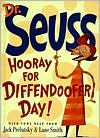
The Number Devil: A Mathematical Adventure
by Hans Magnus Enzensberger, Rotraut Susanne Berner, and Michael Henry Heim (Owl Books,2000) Imagine a whimsical novel, plus math, and you get the picture of this book, which can be enjoyed by readers of all ages.
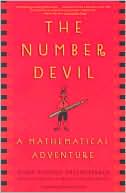
Pippi Longstocking
by Astrid Lindgren (Author), Lauren Child (Illustrator), Tiina Nunnally (Translator) (Viking Juvenile, 2007) This classic children's book has been illustrated by popular contemporary illustrator and children's author, Lauren Child.

Educational technology:
Blogs, Wikis, Podcasts, and Other Powerful Web Tools for Classrooms
by Will Richardson (Corwin Press, 2006) District Administration columnist Richardson explains the emerging technologies of blogging, podcasting, wikis, social networking and other innovations based on RSS.

The Children's Machine: Rethinking School in the Age of the Computer
by Seymour Papert (Basic Books, 1994) The "father of educational computing" provokes us to think hard about the incredible potential to construct knowledge using computers.
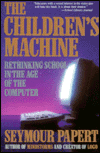
Never Mind the Laptops: Kids, Computers, and the Transformation of Learning
by Bob Johnstone (iUniverse, 2003) A fascinating history of educational computing from WWII through the laptop revolution of the early 1990s.
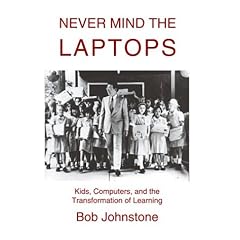
MySpace Unraveled: What it is and how to use it safely
by Larry Magid and Anne Collier (Peachpit Press, 2006) takes the incredibly novel position of suggesting that you know what you're talking about before setting policy at home or in school. The book teaches adults how to use MySpace.com so that they may more rationally discuss social networking with children.
(Peachpit Press, 2006) takes the incredibly novel position of suggesting that you know what you're talking about before setting policy at home or in school. The book teaches adults how to use MySpace.com so that they may more rationally discuss social networking with children.

Internet & Computer Ethics for Kids: (and Parents & Teachers Who Haven't Got a Clue.)
by Winn Schwartau, D. L. Busch (Illustrator) (Interpact Press, 2001) This terrific book should be read
by every parent, educator and teen.

Learning:
Painting Chinese: A Lifelong Teacher Gains the Wisdom of Youth
by Herbert Kohl (Bloomsbury, 2007) Herb Kohl's poetic meditation on life, art, teaching and learning is a gift that keeps on giving.
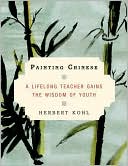
The Book of Learning and Forgetting
by Frank Smith (Teachers College Press, 1998) Smith may have written the most beautiful and thoughtful book about learning in the past decade.
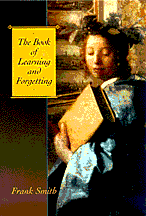
Raising children:
Come on, People: On the Path from Victims to Victors
by Bill Cosby and Alvin Poussaint (Thomas Nelson, 2007) Cosby and Poussaint explore the problems plaguing child rearing in our poorest communities and offer no-nonsense practical advice for adult caregivers and educators.
Unconditional Parenting: Moving from Rewards and Punishments to Love and Reason
by Alfie Kohn (Atria, 2005) Popular education author Alfie Kohn focuses on parenting in an informative book that might make Supernanny crazy.
Reading instruction:
Reading FAQ
by Frank Smith (Teachers College Press, 2007) This book poses the countless questions educators and parents have about reading, and answers them succinctly and in plain English.
School innovation:
The Big Picture: Education Is Everyone's Business
by Dennis Littky and Samantha Grabelle (ASCD, 2004) Now on his fourth decade of successful school reform, Littky demonstrates how it is possible to create successful schools for the 21st century with innovations that are replicable.
The Hundred Languages of Children: The Reggio Emilia Approach Advanced Reflections, 2nd edition
by Carolyn Edwards, Lella Gandini, and George Forman (Ablex Publishing, 1998) American educators of all grades can learn from the municipal preschools of Reggio Emilia, Italy. This book explains their educational ideas better than any book.
href="http://www.amazon.com/exec/obidos/ASIN/156750311X/resourcesforprog">
![]() src="images/books/image018.jpg" width=91 border=0
src="images/books/image018.jpg" width=91 border=0
u1:shapes="_x0000_i1033">In Schools We Trust: Creating Communities of Learning in an Era of Testing and Standardization
by Deborah Meier (Beacon Press, 2003) A fantastic book about creating learning communities within the four walls of the school and beyond by a Macarthur Genius
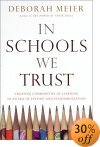
Teaching in these times:
Letters to a Young Teacher
by Jonathan Kozol (Crown, 2007) For more than 40 years, Kozol has given voice to the voiceless children in our cities. In his latest book, he uses the literary device of writing to a new teacher in Boston as a vehicle for exploring issues of pedagogy, politics, social justice and the joy of teaching.

Stupidity and Tears: Teaching and Learning in Troubled Times
by Herbert Kohl (New Press, 2005) A terrific collection of essays by the legendary educator and author.

Tested: One American School Struggles to Make the Grade
by Linda Perlstein (Henry Holt, 2007) Perlstein, a celebrated journalist, chronicles the story of a school that raised test scores dramatically by exploring the sacrifices made and whether continued progress is possible.
The Children in Room E4: American Education on Trial
by Susan Eaton (Algonquin Books, 2007) Eaton writes an in-depth analysis of the crises plaguing urban education through the story of one school in Hartford, Conn., over a period of 18 months.
The Game of School: Why We All Play It, How It Hurts Kids, and What It Will Take to Change It
by Robert Fried (Jossey-Bass, 2005) Fried offers thoughtful critiques on the state of public education and what we might do to improve matters.
Vision, leadership and management:
Letters to the Next President: What We Can Do about the Real Crisis in Public Education (2008 Election)
by Carl Glickman (Teacher's College Press, 2007) This collection of essays by leading educators and citizens offers unsolicited advice about education policy for our next president of the United States.
Selling the Dream : How to Promote Your Product, Company, or Ideas-And Make a Difference-Using Everyday Evangelism
by Guy Kawasaki (Collins, 1992) Kawasaki has inspired countless readers to gather and sustain support for their products and innovations.
Slack: Getting Past Burnout, Busywork, and the Myth of Total Efficiency
by Tom DeMarco (Broadway, 2002) A management expert, DeMarco makes a compelling case for granting employees some much needed time and space.
The Inner Principal
by David Loader (Routledge, 1997) Loader, one of the world's boldest and most accomplished principals, lets readers inside his head and heart as he does his job.

Predict education's future by reading about the past:
The New Education: Progressive Education One Hundred Years Ago Today (Classics in Progressive Education)
by Scott Nearing (New Press, 2007) Originally published nearly 100 years ago!

How Kindergarten Came to America: Friedrich Froebel's Radical Vision of Early Childhood Education (Classics in Progressive Education)
by Bertha von Marenholtz-Bulow (New Press, 2007) Read about the inventor of kindergarten, his radical ideas from a book originally published in 1894 and the fascinating story of how his ideas came to America.

The Public School and the Private Vision: A Search for America in Education and Literature (Classics in Progressive Education)
by Maxine Greene (New Press, 2007)
From Amazon.com - "Maxine Greene, one of the leading educational philosophers of the past fifty years, remains "an idol to thousands of educators," according to the New York Times. In The Public School and the Private Vision, first published in 1965 but out of print for many years, Greene traces the complex interplay of literature and public education from the 1830s to the 1960s—and now, in a new preface, to the present. With rare eloquence she affirms the values that lie at the root of public education and makes an impassioned call for decency in difficult times, once again a key theme in education circles. A new foreword by Herbert Kohl shows how the work resonates for contemporary teachers, students, and parents."

A Schoolmaster of the Great City: A Progressive Education Pioneer's Vision for Urban Schools (Classics in Progressive Education)
by Angelo Patri (New Press, 2007)
From Amazon.com - Angelo Patri's eloquent 1917 chronicle of multicultural education in the inner city remains as relevant today as it was ninety years ago. Long out of print, A Schoolmaster of the Great City illustrates Patri's commitment as a long-time principal at a New York public school to integrating all backgrounds into the classroom and to nurturing a community that extends beyond the school yard. The New York Times Book Review called it "an inspiring and an aspiring vision, an ideal of a force that would be a greater power in molding and Americanizing and democratizing American life than it would be possible to find in all other agencies together."
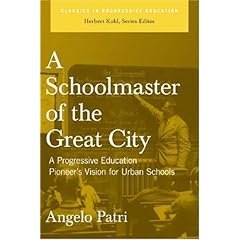
The Progressive Education Movement: Is It Still a Factor in Today's School?
by William Hayes (Rowman & Littlefield Education, 2006) 3/4 of this textbook is a terrific history of progressive educators and its unsung heroes. The chapters on the modern era are of less value.
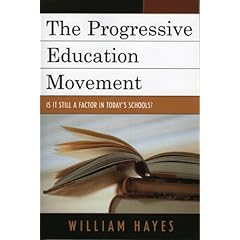
Books by Pulse Contributing Editors:Gerald Coles
Ken Goodman
Alfie Kohn
Etta Kralovek
Stephen Krashen
Susan Ohanian
W. James Popham
Roger SchankLabels: education books. educational technology, Gary Stager, school reform, whole language
























